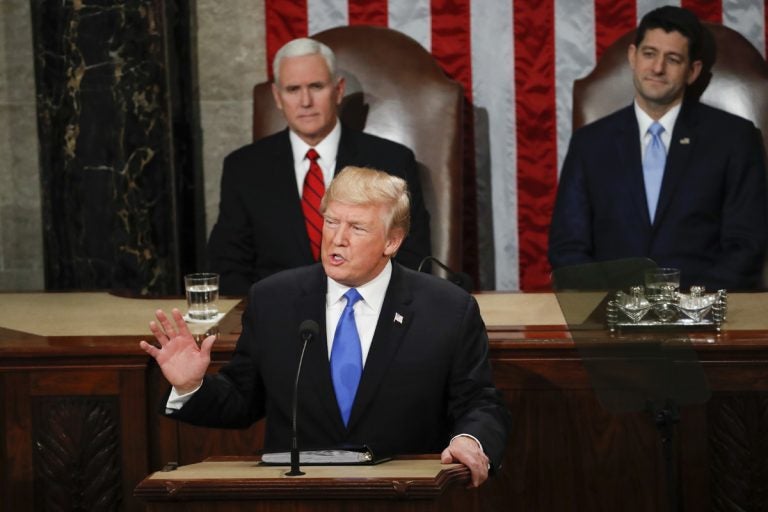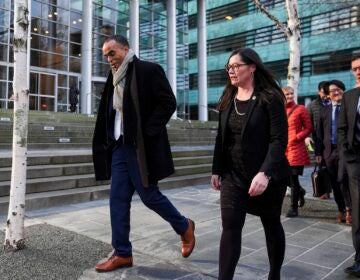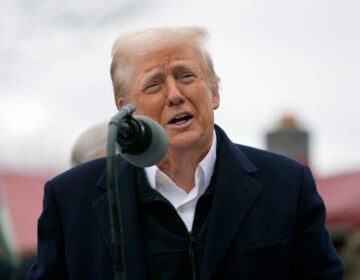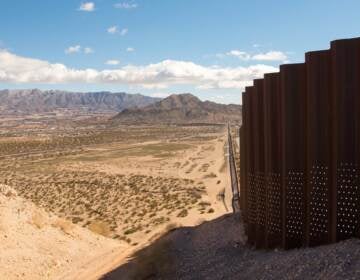Trump State of the Union unites on infrastructure, divides on immigration
President Trump's State of the Union united Democrats and Republicans on infrastructure, but immigration proposal is doing the opposite.

President Donald Trump delivers his State of the Union address to a joint session of Congress on Capitol Hill in Washington, Tuesday, Jan. 30, 2018. (Pablo Martinez Monsivais/AP Photo)
President Donald Trump’s first State of the Union address managed to unite some Democrats and Republicans when it came to his infrastructure plan. However, even though he’s proposing a path to citizenship for the so-called “dreamers” the immigration proposals he laid out divided people mostly along party lines.
Speaking after the speech, U.S. Rep. Brendan Boyle from Philadelphia said he and other Democrats have been offering to work with the president on repairing the nation’s infrastructure since the beginning of Trump’s term.
“I am one of a number of Democrats who’s willing to work with this administration to achieve a real bipartisan infrastructure bill that rebuilds our roads, our bridges, our railways as well as our electrical grid and our sewer lines,” Boyle said.
Still Boyle said he doubts there’s money to pay for Trump’s $1.5 trillion proposal.
“One of the most important issues to me is infrastructure and so I love when they talk about a $1.5 trillion bill. However, they just spent $1.5 trillion on their tax cut, 83 percent of which goes to the richest one percent. So, the fact of the matter is that the bulk of the money that was to be spent on infrastructure has already been spent,” he said.
In the speech, Trump called for a plan that “generates” $1.5 trillion. He did not say all that money would be provided from the federal government. In December, NPR reported the federal spending might be as low as $200 billion.
Republican U.S. Rep. Ryan Costello, who represents parts of four counties west of Philadelphia, said he and other conservatives are asking questions similar to Boyle’s.
“Where do you get the money? That part that was actually probably the part of the speech that was light. Because, yeah, you can lay out a marker, but if you don’t tell us how to get there, you’re not really getting us there,” Costello said.
While some Democrats booed or shouted out “lies” as the president spoke, Costello said he thought Trump had the right tone.
“It was positive, forward-looking, substantively it was on-point, stylistically it was well delivered,” he said.
Local reactions to the immigration policy outlined in the speech show the two sides remain far apart on this issue.
Erika Almiron still sounded upset about 45 minutes after President Trump ended his address.
“I’m glad you waited a little bit I was like so infuriated earlier,” she said.
Almiron heads up Juntos, an immigrants rights organization in Philadelphia
She said as a woman of color, when the President talked about putting American’s first, she didn’t feel included in that group.
“It’s unnerving. It makes you feel really unwelcome in this country. And I was born here,” she said.
For supporters of immigrants, President Trump’s proposal strikes an impossible bargain, by offering protection for some immigrants while stripping it from others.
On the one hand, he called for creating a 12-year long path to citizenship for dreamers, young people whose parents brought them illegally to the U.S. as children.
But in exchange, Trump wants restrictions to legal immigration and to create border wall, saying “Americans are Dreamers too.”
“He’s using dreamers against their own families and their friends,” said Andy Hoover, with the American Civil Liberties Union of Pennsylvania.
Val DiGiorgio, head of the Republican Party in Pennsylvania, says the president’s proposal isn’t hard bargaining, it’s an olive branch.
“For a president who has been outspoken on the rule of law, I think it was a major concession to allow citizenship, not just legalization, but citizenship to 1.8 million so called dreamers,” DiGiorgio said. The Trump proposal goes beyond the temporary protections offered under the Obama administration to people brought to the U.S. illegally as kids.
Giving “dreamers” a way to stay is supported by the majority of Americans, according to polls by Fox News, Politico, and other news outlets.
But the president’s plan would restrict which family members U.S. citizens can bring into the country to “spouses and minor children.” Current law allows them to sponsor more than just immediate family.
As for whether the president can maintain the praise he’s getting for the more bipartisan parts of the address? Republican U.S. Rep.Charlie Dent from the Lehigh Valley, who’s announced he’s not running for another term, says don’t hold your breath. He says there was good will a year ago when President Trump addressed Congress too.
“You know, so that the whole message was gone within a few days, so I hope that doesn’t happen again, but this is the chaos presidency. You never know,” Dent said.
WHYY is your source for fact-based, in-depth journalism and information. As a nonprofit organization, we rely on financial support from readers like you. Please give today.




